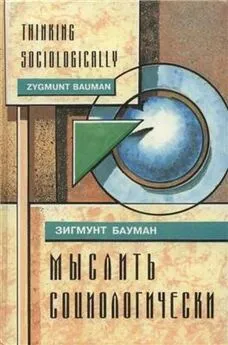Зигмунт Бауман - Текучая современность
- Название:Текучая современность
- Автор:
- Жанр:
- Издательство:Питер
- Год:2008
- Город:Санкт-Петербург
- ISBN:978-5-469-00034-1
- Рейтинг:
- Избранное:Добавить в избранное
-
Отзывы:
-
Ваша оценка:
Зигмунт Бауман - Текучая современность краткое содержание
«Текучая современность» подводит итог анализа, проведенного в двух предыдущих книгах Баумана «Глобализация: последствия для людей» и «В поисках политики».
Текучая современность - читать онлайн бесплатно полную версию (весь текст целиком)
Интервал:
Закладка:
13. Parenti М. Inventing Reality: The Politics of the Mass Media. New York: St Martin’s Press, 1986. P. 65. По выражению Паренти, идея, лежащая в основе массивной и вездесущей телерекламы, независимо от того, что пытаются продать, такова: «Чтобы жить хорошо и правильно, корпоративные производители должны направлять потребителей». Фактически корпоративные производители с помощью армии консультантов, личных советников и авторов книг из серии «Научись сам» могут втолковать почти такую же идею о личной некомпетентности.
14. Ferguson Н, The Lure of Dreams: Sigmund Freud and the Construction of Modernity. London: Routledge, 1996. P. 205.
15. Ferguson FI. Watching the world go round: Atrium culture and the psychology of shopping // Lifestyle Shopping: The Subject of Consumption, ed. Rob Shields. London: Routledge, 1992. P. 31.
16. lllich I. L’Obsession de la sante parfaite // Le Monde diplomatique. 1999. March. P. 28.
17. Glassner B. Fitness and the postmodern self//Journal of Health and Social Behaviour. 1989. № 30.
18. Camus A. The Rebel / Trans. A. Bower. London: Penguin, 1971. P. 226-7.
19. Deleuze G., Guattari F. Oedipus Complex: Capitalism and Schizophrenia / Trans. R Hurley. New York: Viking Press, 1977. P. 5.
20. Tseelon E. Fashion, fantasy and horror // Arena. 1998. № 12. P. 117.
21. Lasch C. The Culture of Narcissim. New York: W. W. Norton and Co., 1979. P. 97.
22. Lasch C. The Minimal Self. London: Pan Books, 1985. P. 32, 29, 34.
23. Seabrook J. The Leisure Society. Oxford: Blackwell, 1988. P. 83.
24. Mathiesen T. The viewer society: Michel Foucault’s «Panopticon» revisited // Theoretical Criminology. 1997. № 1/2. P. 215-234.
25. Atkinson P„ Silverman D. Kundera’s Immortality: the interview society and the invention of the self // Qualitative Inquiry. 1997. № 3. P. 304-325.
26. Ferguson H. Glamour and the end of irony // The Hedgehog Review. Fall 1999. P. 10-16.
27. Seabrook J. The Race for Riches: The Human Costs of Wealth. Basmgstoke: Marshall Pickermg, 1988. P. 168-169.
28. Michaud Y. Des Identites flexibles // Le Monde. 1997. 24 October.
Глава 3. Время и пространство
1. McGreal С. Fortress town to rise on Cape of low hopes // Guardian. 1999. 22 january.
2. Boseley S. Warning of fake stalking claims // Guardian. 1999. 1 february. Цитируя сообщение, подписанное Мишелем Патэ, Полом Ф. Мулленом и Розмари Парсел.
3. Zukin S. The Culture of Cities. Oxford: Blackwell, 1995. P. 39, 38.
4. Sennett R. The Fall of Public Man: On the Social Psychology of Capitalism New York: Vintage Books, 1978. P. 39ff.
5. Sennett R. The Fall of Public Man. P. 264.
6. Uusitalo L. Consumption in postmodernity // The Active Consumer / Ed. Marina Bianchi. London: Routledge, 1998. P. 221.
7. Lehtonen T-К., Maenpaa P. Shopping in the East—Centre Mall // The Shopping Experience / Ed. P. Falk and C. Campbell. London: Sage, 1997. P. 161.
8. Foucault M. Of other spaces // Diacritics. 1986. № 1. P. 26.
9. Sennett R. The Uses of Disorder: Personal Identity and City Life. London: Faber & Faber, 1996. P 34-36.
10. Flusty S. Building paranoia // Architecture of Fear / Ed. Nan Elin. New York: Princeton Architectural Press, 1971. P. 48-49. также: Bauman Z. Globalization: The Human Consequences. Cambridge: Polity Press, 1998. P. 20-21.
11. Auge M. Non–lieux: Introduction a l’anthropoiogie de la surmodernite. Paris: Seuil, 1992. Также: Benko G. Introduction: modernity, postmodernity and social sciences // Social Theory: Interpreting Modernity and Postmodernity // Ed. G. Benko, U. Strohmayer. Oxford: Blackwell, 1997. P. 23-24,
12. Kociatkiewicz J., Kostera M. The anthropology of empty space. Qualitative Sociology, 1, 1999. P. 43, 48.
13. Sennett. The Uses of Disorder. P. 194.
14. Zukin. The Culture of Cities. P. 263.
15. Sennett. The Pall of Public Man. P. 260ff.
16. Benko. Introduction. P. 25.
17. Rob Shields. Spatial stress and resistance: social meanings of spatialization», in Space and Social Theory, ed. Benko and Strohmayer. P. 194.
18. Michel de Certeau. The Practice of Everyday Life, (Berkeley: University of California Press, 1984); Tim Crosswell, «Imagining the nomad: mobility and the postmodern primitive», in Space and Social Theory. P. 362-363.
19. Daniel Bell. The End of Ideology (Cambridge, Mass.: Harvard University Press, 1988). P. 230-235.
20. Daniel Cohen. Richesse du monde, pauvretes des nations (Paris: Flammarion, 1997). P. 84.
21. Nigel Thrift. The rise of soft capitalism, Cultural Values, April 1997. P. 39-40. Эссе Трифта можно описать лишь как потрясающие и оригинальные, но понятие «мягкого капитализма», используемое в названии и всюду по тексту, кажется неправильным употреблением термина и вводящей в заблуждение характеристикой. Нет ничего «мягкого» в программном капитализме легкой современности. Трифт указывает, что «танец» и «серфинг» — лучшие метафоры, чтобы передать природу капитализма в его новом воплощении. Эти метафоры хорошо выбраны, так как они передают невесомость, легкость и способность двигаться. Но нет ничего «мягкого» в повседневном танце и серфинге. Балерины и серфингисты, и особенно находящиеся в переполненном танцзале и на берегу, о который бьются высокие волны, должны быть жесткими, а не мягкими. И они жестки, — как немногие из их предшественников, способных останавливаться или двигаться вдоль ясно отмеченных и хорошо обслуживаемых путей. Программный капитализм не менее тверд и жесток, чем его аппаратный предок. И жидкость совсем не мягкая. Вспомните о наводнении или разрушенной дамбе.
22. Georg Simmel. A chapter in the philosophy of value, in The Conflict in Modern Culture and Other Essays, trans. K. Peter Etzkom (New York: Teachers College Press, 1968). P. 52-54.
23. Как сообщается в Eileen Applebaum and Rosemary Batt, The New American Workplace (Ithaca: Cornell University Press, 1993). Here quoted after Richard Sennett, The Corrosion of Character: The Personal Consequences of Work in the New Capitalism (New York: W. W. Norton & Co., 1998). P. 50.
24. Sennett. The Corrosion of Character. P. 61-62.
25. Anthony Flew. The Logic of Mortality (Oxford: Blackwell, 1987). P. 3.
26. Michael Thompson. Rubbish Theory: The Creation and Destruction of Value (Oxford: Oxford University Press, 1979), particularly pp. 113-119.
27. Leif Lewin. Man, society, and the failure of polities, Critical Review, WinterSpring 1998. P. 10. Критикуемая цитата взята из предисловия Гордона Таллока к книге: William С. Mitchell, Randy Т. Simmons. Beyond Politics: Markets, Welfare, and the Failure nf Bureaucracy (Boulder, Col.: Westview Press, 1994). P. XIII.
28. GuyDebord. Comments on the Society of the Spectacle, trans. Malcolm Imrie (London: Verso, 1990). P. 16, 13.
Глава 4. Работа
1. В предисловии, написанном во время исполнения обязанностей председателя Комиссии празднования наступления 2000 года к работе The Year 2000, ed. Hermann Hahn and Anthony J. Wiener. Here quoted from I. F. Clarke, The Pattern of Expectation, 1644-2001 (London: Jonathan Cape, 1979). P. 314.
2. Pierre Bourdieu. Centre–feux: Propos pour serrir a la resistance centre invasion neo–liberale (Paris: Liber, 1998). P. 97.
3. Alain Peyrefitte. Du «Miracle» en economic: Lecons au College dc France (Pans: Odile Jacob, 1998). P. 230.
4. KennethJowitt. New World Disorder (Berkeley: University of Callifomia Press, 1992). P. 306.
5. Guy Debord. Comments on the Society of the Spectacle, trans. Malcolm Imne (London: Verso, 1990). P. 9.
6. Peter Drucker. The New Realities, London: Heinemann, 19891. P. 15, 10.
7. Ulrich Beck. Risk Society: Towards a New Modernity, trans. Mark Ritter (London: Sage, 1992). P. 88.
8. David Ruelle. Hasardet chaos (Paris: Odile Jacob, 1991). P. 90. 113.
9. Jacques Attali. Chemins de sagesse: Traite du labyrinthes (Paris: Fayard, 1996). P. 19, 60, 23.
10. Paul Bairoch. Mythes ct paradoxes de Ihistoire economique (Paris: La Decouverte, 1994).
11. Daniel Cohen. Richesse du monde, pauvretes des nations (Paris: Flammarion, 1998). P. 31.
12. Karl Polanyi. The Great Transformation (Boston: Beacon Press, 1957), particularly pp. 56-57 and ch. 6.
13. Richard Sennett. The Corrosion of Character: The Personal Consequences of Work in the New Capitalism (New York: W. W. Norton &Co., 1998). P. 23.
14. Sennett. The Corrosion of Character. P. 42-43.
15. La Misere du monde, ed. Pierre Bourdieu (Paris: Seuil, 1993). P. 631, 628.
16. Sennett. The Corrosion of Character. P. 24.
17. Robert Reich. The Work of Nations (New York: Vintage Books, 1991).
18. Sennett. The Corrosion of Character. P. 50, 82.
19. Attali. Chemins de sagesse. P. 79-80, 109.
20. Nigel Thrift. «The rise of soft capitalism», Cultural Values, April 1997. P. 52.
21. Pierre Bourdieu. Sur la television (Paris: Liber, 1996). P. 85.
22. Bourdieu. Contre–feux. P. 95-101.
23. Alain Peyrefitte. La Societe de conftance: Essai sur les origines du developement (Paris: Odile Jacob, 1998). P. 514-516.
24. Bourdieu. Contre–feux. P. 97.
25. Attali. Chemins de sagesse. P. 84.
Глава 5. Сообщество
1. Philippe Cohen. Proteger ou disparaitre: les elites face a la montee des insecurites (Paris: Gallimard, 1999). P. 7-9.
2. Eric Hobsbawm. The Age of Extremes (London: Michael Joseph, 1994). P. 428.
3. Eric Hobsbawm. The cult of identity polities, New Left Review, p. 217 (1998). P.40.
4. Jock Young. The Exclusive Society (London: Sage, 1999). P. 164.
5. Young. The Exclusive Society. P. 165
6. Leszek Kolakowski. Z lewa, z prawa, Moje stuszne poglady na wszystko (Krakow: Znak, 1999). P. 321-327.
7. Bernard Yack. Can patriotism save us from nationalism? Rejoinder to Virioli, Critical Review, 12/1-2 (1998). P. 203-206.
8. Bernard Crick. Meditation on democracy, politics, and citizenship, unpublished manuscript.
9. Alain Touraine. Can we live together, equal and different?, European journal of Social Theory, 2/1998. P. 177.
10. Richard Sennett. The Corrosion of Character: The Personal Consequences of Work in the New Capitalism (London: W. W. Norton, 1998). P. 138.
Читать дальшеИнтервал:
Закладка:









